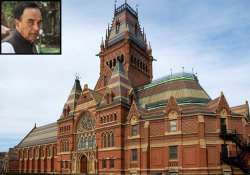Harvard University Removes Swamy 's Courses For His 'Communal' Article
New York, Dec 8: Harvard University has decided to remove courses taught by Janata Party president Subramanian Swamy at its annual summer school session, terming his views as “reprehensible” in a controversial piece he wrote

New York, Dec 8: Harvard University has decided to remove courses taught by Janata Party president Subramanian Swamy at its annual summer school session, terming his views as “reprehensible” in a controversial piece he wrote on Islamic terrorism in India.
At a meeting of Harvard's Faculty of Arts and Sciences, faculty members voted with an “overwhelming majority” to remove two economics courses - ‘Quantitative Methods in Economics and Business' and ‘Economic Development in India and East Asia' - that Swamy teaches at the three-month Harvard Summer School session.
The faculty meeting, convened to approve the 2012 Summer School course catalogue, resulted in a “heated debate” when Comparative Religion Professor Diana Eck proposed an amendment to exclude Swamy's courses from the catalogue, the Harvard Crimson reported.
In a July op-ed piece for an Indian publication, Swamy had recommended demolishing hundreds of mosques and suggested that only Muslims in India who “acknowledge that their ancestors were Hindus” should be allowed to vote.
Eck said Swamy's op-ed “clearly crosses the line by demonising an entire religious community and calling for violence against their sacred places,” adding that Harvard has a moral responsibility not to affiliate itself with anyone who expresses hatred towards a minority group.
“There is a distinction between unpopular and unwelcome political views,” Eck said.
Earlier, more than 400 students had signed a petition calling for Swamy's removal after Harvard had decided to stand by him, affirming its commitment to free speech principles.
Dean of Summer School Donald Pfister said courses included in the catalogue are chosen by individual departments.
“I find (Swamy's) position reprehensible, but on the other hand, it is our duty to support departments and their offerings,” he said.
Philosophy Department Chair Sean Kelly had initially defended the unanimous decision of Harvard's Faculty Council to keep Swamy on the teaching roster as an effort to preserve free speech at the school. Kelly ultimately voted for the amendment to remove Swamy's courses.
“I was persuaded ... that the views expressed in Dr Swamy's op-ed piece amounted to incitement of violence instead of protected political speech,” he said.
Harvard had chosen to stand by Swamy in August in line with its declared commitment to free speech.
However at Tuesday's meeting, faculty members agreed to remove his two courses, effectively removing him from Harvard's teaching roster. Faculty members said Swamy's article was not a product of free speech-but of hate speech.
“(Swamy's position on disenfranchisement) is like saying Jewish Americans and African Americans should not be allowed to vote unless they acknowledge the supremacy of white Anglo Saxon Protestants,” said History Professor Sugata Bose.
After Swamy's controversial piece appeared, a group of Harvard students known as ‘Coalition Against Bigotry at Harvard' had started a petition drive calling on the University to severe ties with him.
The Janata Party leader had received his PhD in Economics from Harvard in 1965 and has served as an assistant and associate professor.
Division of Continuing Education spokesperson Linda Cross had called the article “distressing” but had said “it is central to the mission of a university to protect free speech, including that of Dr Swamy and of those who disagree with him.”
Janata Party chief Subramanian Swamy today said Harvard University should have a re-look at its decision to remove courses taught by him while maintaining that it should have sought his comments before reaching a conclusion.
In his reaction to the University's decision to remove courses taught by him terming as “reprehensible” his views in a controversial piece he wrote on Islamic terrorism, Swamy said the University should have first sought his comments which is a normal procedure and this has not been done.
“The article was written for a Mumbai newspaper and I teach economics in Harvard. I would assume that they would have sent their petition to me asking for my comments which is a normal procedure. But they have not done that,” he claimed.
Swamy said the decision was a “dangerous one” as it makes a person teaching in Harvard accountable for what he writes on any subject anywhere in the world.
“If tomorrow anyone writes on India and writes rubbish about India, they come here, then they can be punished here for what they write in America. That would be a dangerous principle. Harvard should look at it,” he said.